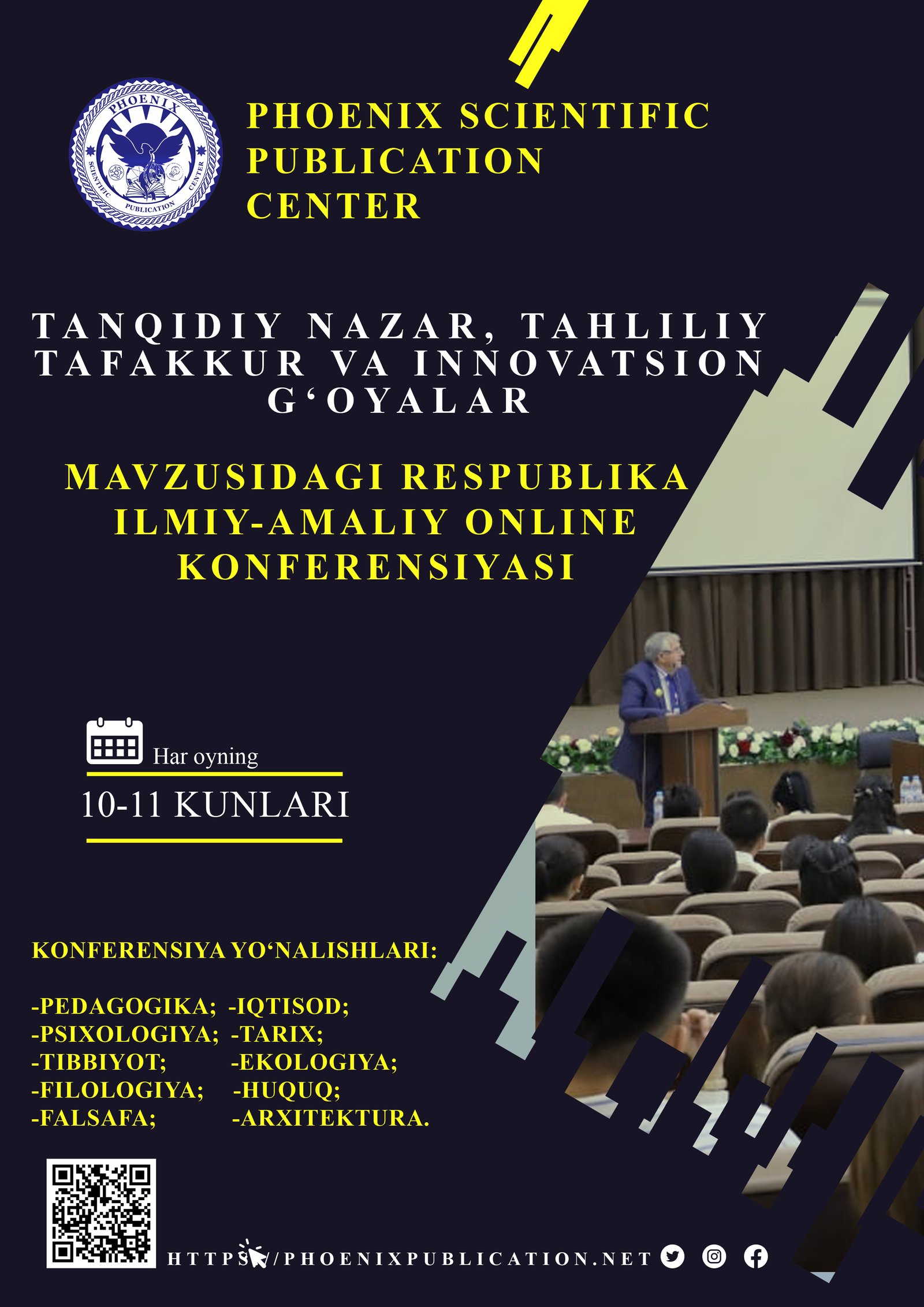Abstract
This article explores the integration of environmental education into chemistry teaching as a means to develop students’ functional scientific literacy. In the face of growing global ecological challenges, it is essential that chemistry education not only provides theoretical knowledge but also equips students with the skills and values needed to understand and respond to real-world environmental issues. The paper highlights how environmental contexts—such as pollution, resource conservation, waste management, and sustainable development—can be effectively embedded into chemistry curricula to make learning more relevant, interdisciplinary, and action-oriented. It also emphasizes pedagogical approaches such as project-based learning, inquiry-driven experiments, and reflective discussion as tools to foster critical thinking, problem-solving, and responsible citizenship. The study suggests that when chemistry lessons are grounded in ecological relevance, students become more engaged, better understand the societal implications of science, and are more capable of applying chemical knowledge in everyday decision-making. The findings support the call for a more environmentally conscious and functionally literate generation of science learners.
References
1. Bennett, J., & Lubben, F. (2006). Context-based chemistry: The Salters approach. International Journal of Science Education, 28(9), 999–1015.
2. Xoliyorova S., Tilyabov M., Pardayev U. Explaining the basic concepts of chemistry to 7th grade students in general schools based on steam //Modern Science and Research. – 2024. – Т. 3. – №. 2. – С. 362-365.
3. Xayrullo o'g P. U. B., Rajabboyovna K. X. Incorporating Real-World Applications into Chemistry Curriculum: Enhancing Relevance and Student Engagement //FAN VA TA'LIM INTEGRATSIYASI (INTEGRATION OF SCIENCE AND EDUCATION). – 2024. – Т. 1. – №. 3. – С. 44-49.
4. Gilbert, J. K. (2006). On the nature of “context” in chemical education. International Journal of Science Education, 28(9), 957–976.
5. Xayrullo o'g P. U. B., Umurzokovich T. M. Inquiry-Based Learning in Chemistry Education: Exploring its Effectiveness and Implementation Strategies //FAN VA TA'LIM INTEGRATSIYASI (INTEGRATION OF SCIENCE AND EDUCATION). – 2024. – Т. 1. – №. 3. – С. 74-79.
6. Pardayev U. et al. THE EFFECTS OF ORGANIZING CHEMISTRY LESSONS BASED ON THE FINNISH EDUCATIONAL SYSTEM IN GENERAL SCHOOLS OF UZBEKISTAN //Journal of universal science research. – 2024. – Т. 2. – №. 4. – С. 70-74.
7. Choriqulova D. et al. The role of the method of teaching chemistry to students using the" assessment" method //Modern Science and Research. – 2024. – Т. 3. – №. 11. – С. 256-264.
8. Narzullayev M. et al. THE METHOD OF ORGANIZING CHEMISTRY LESSONS USING THE CASE STUDY METHOD //Modern Science and Research. – 2024. – Т. 3. – №. 5. – С. 119-123.
9. Amangeldievna J. A., Xayrullo o'g P. U., Shermatovich B. J. Integrated teaching of inorganic chemistry with modern information technologies in higher education institutions //FAN VA TA'LIM INTEGRATSIYASI (INTEGRATION OF SCIENCE AND EDUCATION). – 2024. – Т. 1. – №. 3. – С. 92-98.
10. Amangeldievna J. A. et al. THE ROLE OF MODERN INFORMATION TECHNOLOGIES IN CHEMICAL EDUCATION //International journal of scientific researchers (IJSR) INDEXING. – 2024. – Т. 5. – №. 1. – С. 711-716.
11. Van Driel, J. H., Beijaard, D., & Verloop, N. (2014). Professional development and reform in science education: The role of teachers' practical knowledge. Journal of Research in Science Teaching, 38(2), 137–158.
12. Abdukarimova M. A. Q. et al. Tabiiy fanlar o ‘qitishda STEAM yondashuvi //Science and Education. – 2024. – Т. 5. – №. 11. – С. 237-244.
13. Xayrullo o'g P. U. et al. The importance of improving chemistry education based on the STEAM approach //fan va ta'lim integratsiyasi (integration of science and education). – 2024. – Т. 1. – №. 3. – С. 56-62.
14. O‘G‘Li U. B. X. et al. The effectiveness of using modern information and communication technologies (ICT) in chemistry education //Science and Education. – 2025. – Т. 6. – №. 2. – С. 350-363.
15. Tilyabov M., Pardayev U. KIMYO DARSLARIDA O ‘QUVCHILARNI LOYIHAVIY FAOLIYATGA JALB QILISH USULLARI //Modern Science and Research. – 2025. – Т. 4. – №. 5. – С. 42-44.
16. Pardayev U., Abdullayeva B., Abduraximova M. ZAMONAVIY VIRTUAL LABORATORIYA PLATFORMALARIDAN FOYDALANIB KIMYO FANINI O ‘QITISH SAMARADORLIGINI OSHIRISH //Modern Science and Research. – 2025. – Т. 4. – №. 5. – С. 48-50.
17. Xayrullo o‘g, P. U. B. (2025, June). CHEMICAL ANALYSIS-BASED ASSESSMENT OF THE HERBICIDAL EFFICIENCY OF AZIDO-SUBSTITUTED TRIAZINES. In CONFERENCE OF ADVANCE SCIENCE & EMERGING TECHNOLOGIES (Vol. 1, No. 2, pp. 53-62).
18. Xayrullo o‘g, P. U. B. (2025). INVESTIGATION OF THE REPELLENT ACTIVITY AGAINST IXODID TICKS BASED ON THE STRUCTURAL AND PHYSICOCHEMICAL PROPERTIES OF DIBUTYL ADIPATE. TANQIDIY NAZAR, TAHLILIY TAFAKKUR VA INNOVATSION G ‘OYALAR, 2(1), 265-273.
19. Shernazarov I. et al. Methodology of using international assessment programs in developing the scientific literacy of future teachers //Spast Abstracts. – 2023. – Т. 2. – №. 02.
20. Ergashovich S. I., Umurzokovich T. M. Preparation for International Assessment Research by Forming Types of Functional Literacy in Future Chemistry Teachers //Web of Technology: Multidimensional Research Journal. – 2023. – Т. 1. – №. 7. – С. 49-53.
21. Sadler, T. D. (2004). Informal reasoning regarding socioscientific issues: A critical review of research. Journal of Research in Science Teaching, 41(5), 513–536.
